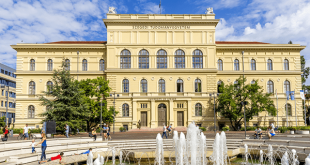Embarking on a higher education journey in a foreign country isn’t just about acquiring knowledge; it’s a transformative experience that extends beyond the classroom. Hungary has piqued the interest of international students seeking a rewarding educational adventure abroad. In this guide, we discuss the life of an international student in Hungary and offer insights, advice, and recommendations to ensure a seamless transition and a thriving academic experience. Stay tuned as we explore what your student life in Hungary might look like – on campus and beyond.
Table of Contents
Benefits of Studying in Hungary
Hungary, nestled in the heart of Europe, has increasingly gained credibility and popularity among international students. Here are some of the compelling reasons to start your academic journey in Hungary:
Exceptional Universities
Hungary is home to globally acclaimed institutions like Eötvös Loránd University and Semmelweis University. The country, therefore, upholds a rich academic tradition, providing diverse programs across arts and sciences.
Internationally Recognized Degrees
The University of Pécs exemplifies Hungary’s commitment to global education standards through the Bologna Process. In addition, inter-institution collaborations and an expert faculty staff enhance the credibility of Hungarian degrees.
Affordable Education
With annual tuition ranging from EUR 5,000 to EUR 8,000 and living costs averaging EUR 500 to EUR 700 per month, Hungary offers quality education without significant financial strain.
Cultural Tapestry
From a cultural standpoint, Hungary boasts a rich heritage, being a country that has been around for more than a millennium. Its location in Central Europe provides a nice cultural melting pot between east and west which can only be an enriching experience for international students.
Multilingual Learning
Universities in Hungary offer programs in English, French, and even in German, facilitating a global perspective. Additionally, Hungarian language courses further aid integration, enhancing the overall student experience.
Financial Support
Various scholarships, including the Stipendium Hungaricum Scholarship Program, cover tuition, accommodation, and a monthly stipend. Add to that the overall affordability, making Hungary a very student-friendly destination.
Startup Career Opportunities
Budapest hosts a burgeoning startup ecosystem, with organizations such as Design Terminal and Hiventures. Hungary, therefore, positions itself as a hub for entrepreneurial-minded students.
How to Get Ready for the Student Life in Hungary
Embarking on your student life in Hungary is an exciting adventure that requires careful preparation. To ensure a smooth transition and make the most of your academic journey, here are the essential aspects to take into account:
Student Visa to Hungary
Before arriving in Hungary, international students need to obtain a student visa. The application process involves submitting necessary documents, including an acceptance letter from a Hungarian university, proof of accommodation, and proof of financial means. Check the official website of the Hungarian consulate in your home country for specific requirements.
Once in Hungary, students typically need to exchange their student visa for a residence permit. This process involves visiting the immigration office, providing updated documentation, and paying the required fees. It’s essential to start this process well in advance of the visa expiration date.
For a detailed guide on the student visa process to Hungary, check our article on the subject.
Accommodation Arrangement
When preparing for your study journey in Hungary, consider various accommodation options. The most affordable choice is often a university dormitory, fostering friendships and a sense of community. Alternatively, renting an apartment provides privacy, offering insights into Hungarian life.
Costs vary, with Budapest ranging from HUF 70,000–150,000 for dorms and HUF 120,000–200,000 for apartments monthly, plus overheads. Deposits are common but reimbursed upon moving out. Seek guidance from your university’s international coordinator or mentor, check dedicated Facebook pages, or explore agencies for assistance. Prioritize a comfortable study environment where you can share experiences with new friends.
Check here our guide on student accommodation and housing in Hungary.
Currency in Hungary
To prepare for your study journey in Hungary, familiarize yourself with the local currency, the Hungarian Forint (HUF), used since 1946. Banknotes range from 500 to 20,000, featuring watermarks and security strips. Coins include 5 to 200 forints. Consider opening a bank account for convenience with just your passport.
Moreover, ATMs are widely available for currency withdrawal, and credit/debit cards are commonly accepted. To provide a better understanding, as of January 2024, 1 Euro is approximately 380 HUF, and 1 US Dollar is approximately 348 HUF. Check the Hungarian National Bank’s website for current exchange rates before converting currency.
Living Cost in Hungary for Students
The average living cost for students in Hungary is approximately between 20,000 and 30 000 HUF depending on the city you’re living. This includes accommodation, food, transportation, and miscellaneous expenses. Create therefore a budget to manage your finances effectively.
Moreover, take advantage of student discounts, cook at home to save on food expenses, and explore affordable shopping options. Consider part-time work opportunities, but ensure they don’t interfere with your studies. Lastly, most stores are open Monday to Saturday, with varying hours. Explore local markets, like Nagycsarnok, for fresh produce. Utilize sales periods for affordable quality clothing.
Transportation Options
In Hungary, public transportation is efficient, with buses in all cities, trams and trolley buses in larger ones, metro services, HÉV suburban railways, and boat services in Budapest. Passes, available for different durations, cover all transport types. Tickets for any transport can be bought at stations or kiosks.
Single tickets allow one journey on a line, but changes require multiple tickets. Economically, monthly or yearly passes are better for regular users. Students with valid ID enjoy reduced rates. Walking or biking are also common and eco-friendly modes of transportation, especially for short distances.
To help you budget in preparation for your student life, read our guide on the studying and living cost in Hungary.
Health Care and Medical Insurance
Foreign students in Hungary benefit from free first aid and emergency medical care. However, for other treatments, they must cover the costs. Full-time international students, under an agreement or fellowship from the Hungarian Ministry of Human Capacities, enjoy limited entitlement to healthcare services. Those who work get coverage from where they work.
Participants in international student exchange programs or state-run institutes receive free medical care, utilizing Hungarian social security facilities. EU citizens hold healthcare coverage through the European Health Insurance Card in Hungary. Non-EU international students may secure health services by signing an agreement with the Hungarian Health Insurance Fund. They can therefore benefit from the local Health Insurance Fund, with a contact amounting to 30% local minimum wage cost.
Campus Life in Hungary for International Students
The academic year structure in Hungary typically runs from September to June. Familiarize yourself with the academic calendar to plan effectively. Hungarian higher education emphasizes interactive learning, group discussions, and research projects. Be ready for a collaborative and engaging approach to education.
Moreover, make sure to maintain a healthy life balance through participating in sports offered by institutions. Consider as well joining cultural activities like choirs or art groups. Furthermore, check scholarship options, like Stipendium Hungaricum, to cover tuition and expenses. Budget around 6000 EUR for tuition, and consider part-time work (up to 20 hours/week). And if you are an EU citizen, you can even explore student loans in Hungary. Finally, for your life off campus, learn some Hungarian for a smoother everyday life.
Joining a Student Network
Joining a student network is a fantastic way for international students in Hungary to embrace campus life. Almost every Hungarian university has its own network, offering a chance to integrate into the local community. By connecting with these groups, you can enjoy a fully international environment, maximize your stay, and participate in programs tailored for foreign students.
These networks also promote scholarships and internships, host international and national workshops, and provide valuable leadership experiences. Contact your university to get more information and make the most of your time in Hungary. By way of example, we suggest:
- AEGEE (Association des Etats Généraux des Etudiants de l’Europe / European Students’ Forum) with 3 “antennas” in Hungary, namely in Budapest, Debrecen, Pécs
- AIESEC Hungary which you join to develop your leadership potential through volunteering and internships.
- BEST (Board of European Students of Technology) Budapest for students who are passionate about tech
Learning Hungarian
Embracing campus life in Hungary as an international student means diving into the local culture. Learning Hungarian is therefore a great way to connect. Don’t be intimidated by its difficulty; opportunities for learning abound, both in-person and online. Some institutions such as the University of Pécs, University of Szeged, Eötvös Loránd University, and University of Debrecen all offer language courses with credits that can transfer.
If you prefer flexibility, language schools are an option. Engage with native speakers for fluency, and soon you’ll navigate Hungary effortlessly, savoring the rich experiences offered by these programs.
Find out more about these institutions through reading our top 10 universities in Hungary.
Tips to Adjust to the Hungarian Climate
Hungary experiences a continental climate with distinct seasons. Summers are warm, with temperatures ranging from 25 to above 35°C, while winters can be cold, with temperatures dropping below freezing. Spring and autumn provide milder weather transitions.
In winter, it usually snows, with the coldest month being January and the hottest is July. Prepare, therefore, for Hungary’s winter by purchasing warm clothes locally. Your country may lack suitable winter wear. Find affordable, high-quality options at second-hand shops. Invest in a very warm coat with a hood and non-slip boots.
Moreover, combat the sun’s scarcity by taking vitamin D supplements. Winter in Hungary means limited sunlight, impacting your body’s vitamin D production. These supplements prevent fatigue and boost mood.
Also, budget wisely, as utility costs spike during winter in rented apartments. Factor in heating expenses when planning your budget for a smoother study journey in Hungary’s chilly climate.
Must-Visit Places and Experiences in Hungary
Hungary boasts a rich tapestry of cultural and recreational activities. While studying in the country, make sure to attend festivals, explore historical sites and engage in sports or other social clubs to meet new people and unwind from academic pressures. This only contribute to make your journey in Hungary no less than outstanding!
To help, you can even make a bucket list that goes beyond textbooks and lecture halls, allowing you to immerse yourself in the rich tapestry of the Hungarian culture and history.
Budapest’s Iconic Landmarks
Begin your exploration in the heart of Hungary – Budapest. Take the time to enjoy the architectural wonders of Buda Castle, where history and elegance converge. Cross the iconic Chain Bridge that connects Buda and Pest, with its stunning views of the cityscape. Also, don’t miss the Parliament Building, a majestic symbol of Hungary’s history and democracy, especially when illuminated at night.
Lake Balaton
Escape the academic hustle and bustle by heading to Lake Balaton, often referred to as the “Hungarian Sea.” This picturesque freshwater lake is not only Europe’s largest, but it’s also one of the best places to enjoy a serene backdrop for relaxation. You can even spend a weekend exploring lakeside towns, indulging in water activities, or simply enjoying the sunsets over the tranquil waters.
Cultural Events
To immerse yourself in Hungary’s vibrant cultural scene, you can attend events and festivals that take place throughout the year. For example, the Budapest Spring Festival in April is one of the most prestigious cultural events in Hungary. There is also the Budapest International Documentary Festival (BIDF) in January offers an opportunity to discover some of the best contemporary documentaries from around the world.
Thermal Baths Experience
Discover Hungary’s therapeutic side by indulging in a relaxing visit to one of its renowned thermal baths. Széchenyi Baths in Budapest, with its stunning architecture and various thermal pools, offers a rejuvenating experience. It’s a perfect way to unwind and connect with locals who frequent these baths for both relaxation and socializing.
Historical Towns and Castles
Beyond Budapest, students can also indulge in the exploration of Hungary’s historical towns and castles. Eger, for instance, with its Baroque architecture and thermal baths, is also home to the iconic Eger Castle. Moreover, visiting towns like Pécs, with its rich Ottoman heritage, and the medieval town of Szentendre can transport you back in time. Those are just examples of ways to get a deeper understanding of Hungary’s diverse history.
Danube Bend Exploration
Lastly, you can embark on a scenic journey along the Danube Bend, where the river winds through picturesque landscapes. While at it, you can pay a visit to the medieval town of Visegrád, explore the historic Esztergom Basilica, and take in the breathtaking views from the Visegrád Citadel. This excursion promises not only natural beauty but also a glimpse into Hungary’s medieval past.
To sum up, creating a bucket list with these must-visit places and experiences ensures that your journey in Hungary becomes a well-rounded adventure. Don’t hesitate to explore these various facets of the Hungarian culture – from its dynamic capital city to the serene landscapes of other cities. You’ll find out soon enough how these will make every moment of your education abroad memorable in many ways!
Challenges Related to Studying in Hungary
Life in Hungary for a student comes with its unique set of challenges. Here are some of the most frequent issues international students must face:
- The limited number of universities—only 25—that offer degree courses, that have made it into the top global rankings. The University of Szeged is the only institution present in the QS Rankings in 2024, ranking between 501 and 550.
- Climatic extremities, especially for Eastern foreigners, represent another obstacle. Winters can therefore plummet to as low as -10°C (14°F) in remote locations. So, understanding the weather conditions is crucial for survival and comfort.
- The language barrier is another significant challenge. Hungarian being the official language in the country, unfortunately, most locals are not proficient in other foreign languages. Even though English is the medium of instruction in the main higher education institutions, limited fluency in English among the population may hinder day-to-day interactions. The solution is to take advantage of the Hungarian language courses that universities provide. This also enhances student’s chances to find part-time jobs in Hungary.
- Moreover, the variability in the quality of education across institutions can be challenging. There might be cases where some places resemble scams due to outdated knowledge among teachers.
- Lingering consequences of the communist era and a somewhat grumpy demeanor among the locals might add further layers of complexity to the student experience in Hungary.
To sum up, student life in Hungary, like in any other foreign country, comes with its share of challenges and problems. But nothing that cannot be overcome as the vibrant student community, welcoming individuals and the unique cultural experiences all contribute to make the journey in Hungary worthwhile.
This post is also available in ar.




 Aljawaz Your guide to study abroad
Aljawaz Your guide to study abroad









